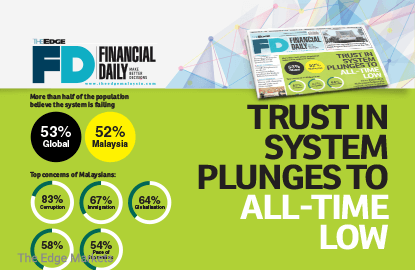
KUALA LUMPUR: More than half of Malaysians (52%) believe the current overall system has failed them — it is unfair and offers little hope for the future — while only 12% believe it is working, a new survey by Edelman revealed.
For the first time, Malaysia fell on the “distrustful” end of Edelman’s index, which gauges respondents’ trust in the government, business, media and non-governmental organisations (NGOs).
The Malaysia’s edition of the 2017 Edelman Trust Barometer pointed to corruption and immigration as respondents’ main concerns.
Edelman Malaysia managing director Robert Kay said among the 1,150 public respondents to the survey, more than 80% expressed concern about corruption as a hindrance to make changes necessary to solve their problems and compromises the safety of citizens, and that these concerns could be driven by the higher visibility of success by the Malaysian Anti-Corruption Commission (MACC), which made several high-profile arrests in 2016.
“Sabah’s Watergate came to mind when the authorities arrested two top officials from the Sabah Water Department [in December last year]. During the raid, it took 30 officers some 15 hours to count RM48 million in cash,” Kay told The Edge Financial Daily after Malaysia’s launch of the 2017 Edelman Trust Barometer yesterday.
However, he noted the improvement of nine points to 43% in the level of trust among the informed public towards the government.
Kay also shared that there were no new flash points that could further hurt the government’s credibility while businesses and consumers have accepted and adapted to the goods and services tax.
“Political fatigue from constant repeats of the same 1Malaysia Development Bhd allegations is also a positive. The doom and gloom forecast by critics that Malaysia’s economy would tank was disproved by the government as Malaysia’s economy continues to grow, albeit at a slower pace.
“Other headlines such as the billion-dollar trades with China and the legalisation of popular ride-sharing platforms have also helped the image of the government as one who listens to the voice of the people,” Kay said.
Ho Kay Tat, publisher and group chief executive officer of The Edge Media Group, shared in a panel discussion that there is a general mistrust of institutions and authorities, be it political or business, due to disappointment.
“I think generally people feel that they have been let down. We (The Edge) did a survey back in November last year and it was very interesting. The ranking may differ, but generally corruption was the most important issue to them (respondents) … we thought that high cost of living would be the No 1 issue, but corruption was the one. It really surprised us, but clearly the feeling is that people are disappointed and have been let down,” said Ho.
He added that regardless of the issues faced by Malaysia, there is a need to consistently press the people with authority to be honest with the truth and facts.
Anne Munro-Kua, an author and professional coach, who was one of the panellist at the discussion, said while the MACC might have made several high-profile arrests, the fact that the agency is under the Prime Minister’s Department has diminished its independency and credibility.
According to her, corruption is part and parcel of crony capitalism and that it is not good for business as it creates unfair competition.
“The NEP (New Economic Policy) was seen to be the way forward to lift [the] people out of poverty. That was really the birth of an agenda or so to build the capitalist class, which has now become rampant crony capitalism,” Munro-Kua said.
She pointed out that some of the public higher education institutions like Universiti Teknologi Mara are not available to non-bumiputeras or non-Malays, causing a racial divide in the country. Thus, there is a need for more dialogue to address such critical issues, Munro-Kua added.
“Dialogue is not happening right now because of the silo that we are living in. There’s an echo chamber among people with different political persuasion. There is an echo chamber ethnically here and that’s a problem … to overcome that, facilitate conversation among people who don’t agree with each other … it’s got to be done with a political will,” she added.
Another panellist, deputy leader of Umno Youth Wing Khairul Azwan Harun, said distrust of the government is part of democracy. However, he noted that the higher level of trust held by an informed public in the government as revealed in this year’s Edelman survey as a sign of improvement for the government.
He also pointed to Malaysia's 30-year transformation plan, Transformasi Nasional 2050, as a process of listening to the people that the government has proactively taken.
Meanwhile, Edelman shared that 2017 is the first time when globally, there is a trust crisis across the institutions of government, business, media and NGOs.
The Edelman Trust Barometer is an annual trust and credibility survey done by research firm Edelman Intelligence. The 2017 Edelman Trust Barometer is the firm’s 17th annual survey globally, while it is Malaysia’s sixth, and consisted of 25-minute online interviews conducted from Oct 13 to Nov 16, 2016.